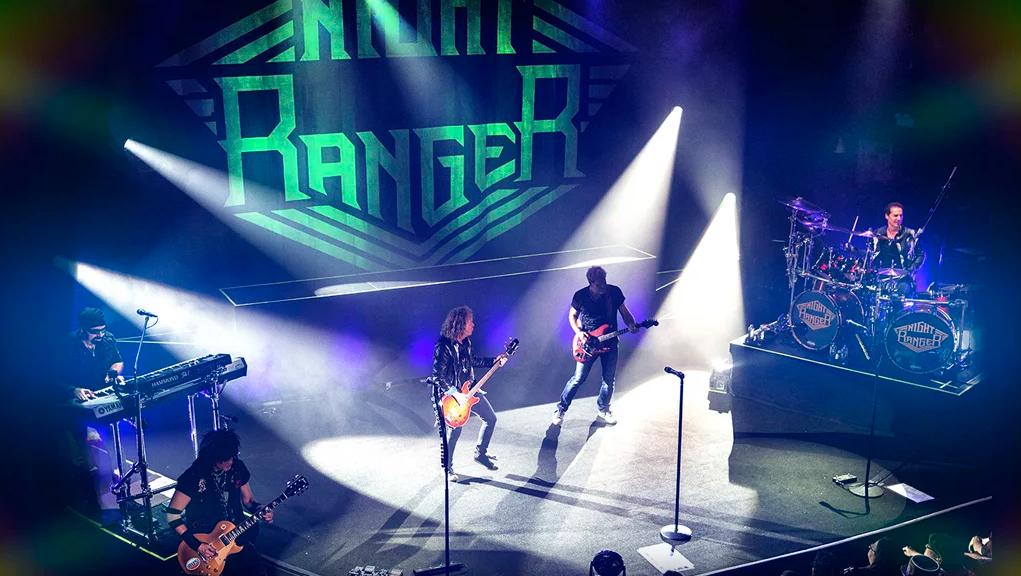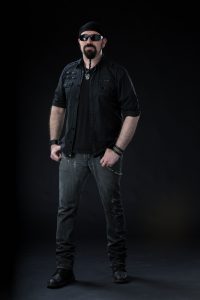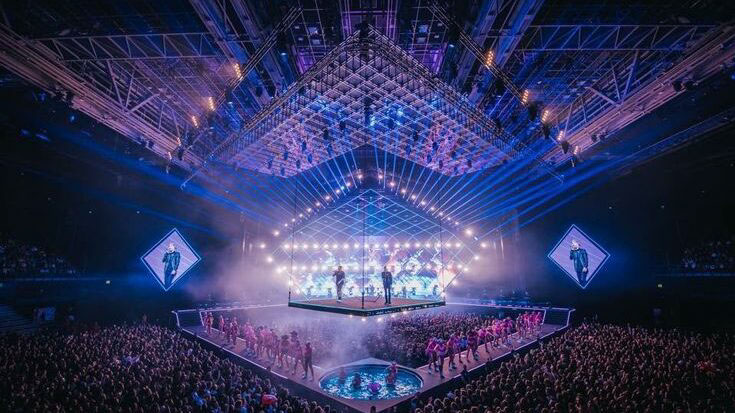
Masters Radio was invited to a recent Night Ranger concert and was allowed backstage to meet and talk with the band. Eric Levy, keys-master, talked to us about what it was like to be a part of such a successful band.
Rob – Masters Radio defines a “Master” as being a band or artist that first had a hit twenty years ago or more. How do you define a Master?

Eric – To me, a master is someone who’s doing their thing at a high level. There are master lyricists, who can communicate images/feelings/ideas in a symbiotic way with the music. Or master instrumentalists, songwriters, etc. But there’s another layer too. A great singer/songwriter may not be the best sight reader, maybe they’ve focused more on their own songs than on learning to read the compositions of others. To really master anything, you eventually have to focus on that thing and be okay with less development in other areas. I’ve got my strengths and weaknesses too, we all do to some extent. The more I grow and reach personal goals as a musician, the more I realize I’ll never run out of things I could do better. I don’t find this depressing in the least, it’s a core reason why I love music.
Rob – Who would you consider a Master (or are Masters) in the world of popular music?
Eric – I’ve been listening to a good amount of Stevie Wonder lately, and I think a case could be made that he and Louis Armstrong (whose music was pop in its day) have influenced pop vocalists more than anyone in the history of American recorded music. That scale runs that Stevie sang, he had such a unique style at the time. Nowadays, if you tune into a show like “The Voice”, everyone who’s not a country artist has a little Stevie in them. And on top of that, he’s this iconic keyboard player too! His synth bass on “Boogie On Reggae Woman”, for instance, to his Rhodes on “I Wish”, is at the roots of my influences.
Rob – Night Ranger has been a hit band for over thirty years. How has technology changed the way your music sounds today compared to when you first were on the charts?
Eric – Music tech has come a long way in the last 36 years! But it’s also ushered in new challenges. Yes, I’d say any new music coming out today has no excuse for out-of-tune vocals or groove issues. But there’s a balance to be found. Accurate isn’t always better. When you move a note around, to line up more closely with the grid, it might be closer to what the player intended, but you risk losing humanity. In EDM, I don’t think that’s an issue, everyone expects that music to sound like it came out of a computer. But rock ‘n roll, that’s gotta be alive, be human to some degree. Modern tools are great, I wouldn’t want to go back to the stone ages of recording. But finding the right balance is key.
Rob – Hollywood has made touring look like one non-stop party. How would you and your bandmates describe being on the road?
Eric – Well, none of us are in our 20’s anymore. We’re psyched when there are good WiFi and a Starbucks in the hotel lobby 🙂 But we don’t act like we’re over the hill either. There are plenty of tequila shots, but we’re not getting trashed out of our minds. I’d like to think we’re old enough to be responsible, but young enough to enjoy ourselves. When we’re onstage, we’re up there with energy, and as we deliver that to the audience, I feel it replenishing back to us from the crowd. In a sense, we’re celebrating being alive, we’re celebrating the rock! We’re truly enjoying the experience, and to that degree, it is a non-stop party.
Rob – Are you guys still writing music? If so, how has that process changed and when and where would your fans be able to hear it?
Eric – Yes, we’re all composing music, be it for Night Ranger, or for outside or solo projects. I joined the band in 2011, and since then we’ve released three full studio albums, plus two live DVDs. It seems like a good output to me, compared to many other classic rock bands. Our three remaining original members, they were the ones writing hit songs in the ’80s, I’m just happy and humble to be part of it.
Rob – Are there pet peeves that you guys have as far as fan interaction? Or, are there do’s and don’ts to approaching you guys that you would recommend?
Eric – We’re all just human beings really. I’d encourage fans to simply be mindful of that. We love it when people are into the band, into the music – there wouldn’t be many bands around if there weren’t also people who want to hear their music! Any artist who says they don’t like their fans may actually not like themselves. But by the same token, please be understanding if you don’t get a response back on social media, or someone gets in a vehicle after a show without first signing autographs. I’m an introvert at heart, and sometimes I don’t quite have the bandwidth to respond to everyone. I intentionally take days off from social media, possibly to the detriment of my career.
Rob – What changes would you like to see in the current music producing environment?
Eric – I’m hoping for the tech to someday emerge, to play music remotely and latency-free over a network in real time. I’ve been told it has to do with the way our current tech moves data in cells or packets, that it may not be possible. But this would open up some amazing possibilities.
Rob – Many fans want to hear the standard classic hits that made you guys famous. How do you keep them fresh for you to play on tour when you may have played the song thousands of times?
Eric – Well, at this point, I’ve played our core songs hundreds of times. Sometimes my mind will wander while I’m onstage – like when you’re driving a route you’ve driven hundreds of times, you can go on auto-pilot to a certain degree, and know where to go without thinking about it. But then I’ll catch myself, and think “what am I doing?!” I don’t get an unlimited supply of shows to play, someday I will play my last show, each one is valued and precious. When we’re playing Sister Christian, and Kelly Keagy drops out during the first verse, and it’s just me accompanying the singing audience… that’s something I never want to take for granted, that’s something special. I’ve been at this long enough to realize that I’m actually at my best when I’m not getting in my own way. When I’m not thinking, when I’m fully present, experiencing the music, as a cog in Night Ranger rather than a separate lonely self, that’s when it feels sensational, that’s what I’m striving for.
Rob – Who are you listening to right now that you think will be a future Master?
Eric – I like Jacob Collier. He’s a true prodigy, phenomenally talented, and seems like a good dude too.
Rob – If I were able to wave a magic wand and grant you the ultimate wish for the band, what would you guys ask for and why?
Eric – I’d wish for everyone to stay healthy, and to stay safe throughout our travels, so we can continue to rock for years to come.
